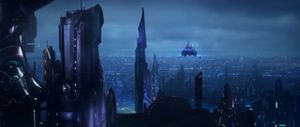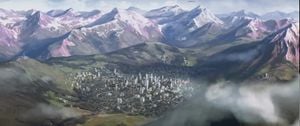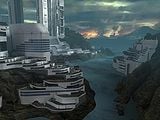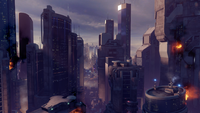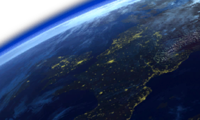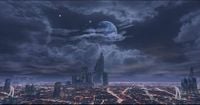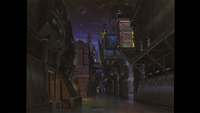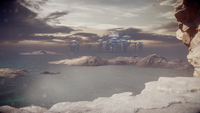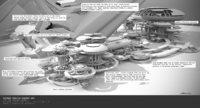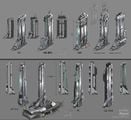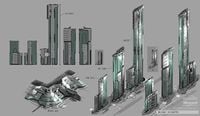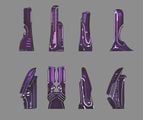City
From Halopedia, the Halo wiki
| There is more information available on this subject at City on the English Wikipedia. |
A city is a type of settlement that sapient species create. They were often large and complex. Cities can be built on planets or on Space stations. Exact elements of cities depend on the species that create them.
The word "urban" is often used to describe city areas.[2]
Types[edit]
Human[edit]
For a list of human cities, see here here
Ancestors[edit]
Prior to the activation of the Halo Array, one of humanity's greatest cities was Marontik.
Post-Great Purification[edit]
Human cities can be found near water bodies[3][4][5] or almost totally land locked.[1][6] Cities have been built in deserts,[6] in mountainous valleys,[1] along rocky coastlines,[5] and on islands.[3]
Some cities are filled with buildings. Occasionally buildings have landing pads for various aerospace craft,[4][7] skybridges connecting to other buildings and outdoor courtyards on roofs.[7] Other cities are actually arcologies. Several examples of this include the Castra Arcology,[8] the Haven arcology.[9][10] and New Mombasa.[Note 1] In different cases, the city contains minimal or no buildings at all like the CAA Chalybeate which became the hub of a city composed of permanently parked starships.[11]
In terms of physical infrastructure, cities often have transit systems featuring Maglev trains.[5][12][13] Roads for Civilian vehicles were also a common feature of human cities.[6][14] Quite a few cities also prominently hosted Space elevators.[3][5][15] Paired with the space elevator, all six of Earth's tether cities have Superintendent-class artificial intelligences.[16] Due to this infrastructure, cities can be identified on the surface of planets in darker conditions.[17][18]
Structures and physical infrastructure were created using metals,[14][19] concrete-like materials,[20][21] and wood-like materials.[7]
Cities often have their own organizations like emergency forces. Examples of emergency services include the New Mombasa Police Department, Boston Emergency, or Elysium City Law Enforcement. A select number of cities are considered "capitals". Some like Casbah City are their planet's capital.[22] Others like Cairo were the capital of their country.[23]
An Ancestor city.
New Alexandria, a terraced city on Reach.
Various cities in the European Union, Earth, at night.
Covenant[edit]
Designed as the Covenant's capital, High Charity featured its own city.[24] The Covenant were also known to use derelict Forerunner cities, like with the Ten Cities of Edification.[25]
Sangheili[edit]
The Sangheili made and designed their own cities. In the case of Sunaion, it was a "temple city",[26] with tall buildings that have a minimal footprint.[27] In the instance of the Tower of Ghalod'n, the entire city was mostly a single tower.[28]
Sanghelios is mostly composed of city-states, led and named after specific Sangheili families.[29][30]
For a list of Sangheili cities, see here
Kig-Yar[edit]
The Kig-Yar had developed at least one major city, Tilu City. It was old and primarily filled with merchants.[31]
Sunaion, a seaborne temple city on Sanghelios.
The Tower of Ghalod'n, a city-tower.
A city on Feldokra.
Forerunner[edit]
Forerunners built their own cities. There were quite a few different types of cities.
The capital of the Ecumene was the city-station of Maethrillian.
Forerunners also built cities on planets, some of which survived the nearly 100,000 year gap from the firing of the Halo Array like the Ten Cities of Edification.[25] Other ground cities of the Forerunners were the ones built on Triniel.[32]
Production notes[edit]
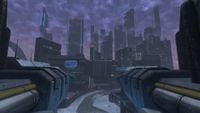
During the development of Halo 3, a special visual look-development level called "Forerunner City" was created.[33] This featured a Forerunner city composed of a single building.[34] It was eventually cut but the exterior design was reused in the Halo Legends short Origins.
The map Icebox of the cancelled Halo Online featured the real world city of Tyumen, Russia. A cut map for the game was also supposed to be set in Seongnam, Korea but wasn't implemented before the game's cancellation .
Gallery[edit]
Notes[edit]
- ^ In this piece of concept art for Halo 3: ODST refers to the large structures in the map as being from an arcology.
Sources[edit]
- ^ a b c Halo: The Fall of Reach - The Animated Series
- ^ Halo Waypoint, New Mombasa (Retrieved on Jun 1, 2020) [archive]
- ^ a b c Halo 3: ODST, campaign level, Prepare To Drop
- ^ a b Halo 5: Guardians, multiplayer map, Empire
- ^ a b c d Halo: Reach, campaign level, Exodus
- ^ a b c Halo 4, campaign level, Epilogue
- ^ a b c Halo: Reach, campaign level, New Alexandria
- ^ Bungie.net: Meet the Squad (6/2/2009)
- ^ Halo: Reach Limited Edition, Intersystem News: HAVEN TERROR BOMBING KILLS TWO MILLION
- ^ Halo: Reach, Dr. Halsey's personal journal
- ^ Halo: Renegades, Chapter 1
- ^ Halo 2, multiplayer map, Terminal
- ^ Halo: Contact Harvest, p. 45
- ^ a b Halo 3: ODST, campaign level, Mombasa Streets
- ^ Halo 4, multiplayer map, Skyline
- ^ Halo: The Essential Visual Guide, p. 191
- ^ Halo 2, campaign level, Cairo Station
- ^ Halo 4, campaign level, Midnight
- ^ Halo: Reach, campaign level, Exodus
- ^ Halo: Reach, Day Before
- ^ Halo 4, campaign level, Prologue
- ^ Halo Waypoint: Universe - Tribute
- ^ Halo Encyclopedia (2009 edition), p. 294 (2011)
- ^ Halo Waypoint: High Charity
- ^ a b Halo: Silent Storm, Chapter 26
- ^ Halo Waypoint: Universe - Sunaion
- ^ Halo 5: Guardians, campaign level, Battle of Sunaion
- ^ Halo Mythos: A Guide to the Story of Halo, p. 144
- ^ Halo: The Cole Protocol, p. 93
- ^ Halo: Glasslands, p. 58
- ^ Halo: Mortal Dictata, Chapter 6
- ^ Halo: Renegades, Chapter ??
- ^ Picasa: Paul Russel > Halo 3: The Lost City (defunct, Archive)
- ^ Paul Russel on Twitter: Thanks! I wanted to get past our current notion of cities, instead of individual buildings, city is a single building.
